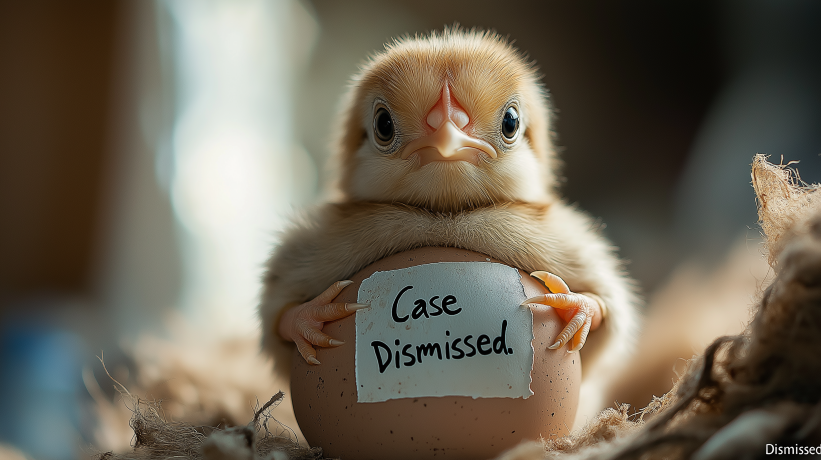
Kroger successfully defeated a proposed class action lawsuit alleging its "Farm Fresh Eggs" label deceived consumers about the hens' living conditions. The court's dismissal highlights the high bar for pleading deception based on labeling and the limits of consumer confusion when interpreting general claims.
by LawInc Staff
August 8, 2024
Kroger has won dismissal of a proposed class action lawsuit claiming its “Farm Fresh Eggs” label is deceptive and misleading to consumers. The suit alleged reasonable shoppers would interpret “Farm Fresh” to mean the eggs came from hens living ideal, free-range lives on picturesque farms – not crowded cages in industrial facilities.
This case highlights the challenges of pursuing misrepresentation claims based on product labels, the strict requirements for pleading deception under consumer protection laws, and what language courts may deem non-actionable puffery vs. factual claims.
Get the full scoop on the lawsuit’s allegations, Kroger’s key defenses, the court’s reasoning for dismissal, and valuable insights for both consumers and companies on walking the line with product claims.
1. Understand the Lawsuit’s Allegations
-
- Plaintiff: Adam Sorkin, an Illinois consumer, on behalf of himself and a putative class of similar purchasers
- Defendant: The Kroger Co., a national grocery chain and parent company of Roundy’s
- Product: Roundy’s private label eggs sold at Mariano’s stores in Illinois labeled as “Farm Fresh Eggs”
- Core Claim: The “Farm Fresh” label falsely leads consumers to believe the eggs come from free-range hens on idyllic farms, not caged hens in industrial facilities
- Cause of Action: Violation of the Illinois Consumer Fraud and Deceptive Business Practices Act (ICFA) by engaging in misrepresentation
Plaintiff’s Key Contentions:
-
- To Sorkin and other consumers, “Farm Fresh” conveys hens “living a natural life on a farm, pecking and playing in fields,” not confined to cages
- A consumer survey showed 41% of Kroger customers thought “Farm Fresh” eggs came from cage-free hens, while 45% were unsure
- “Farm Fresh” is misleading because eggs with this label aren’t produced on real farms as consumers envision but in large industrial operations
- Sorkin paid a premium price for “Farm Fresh” eggs ($1.49+/dozen) and wouldn’t have bought them or paid as much if not for the deceptive labeling
- Use of the term breached the ICFA by misrepresenting the eggs’ sourcing in a way that misled and damaged Sorkin and the class
Kroger’s Key Defenses:
-
- Nothing about “Farm Fresh” suggests the hens were uncaged or free-range – it simply means fresh eggs direct from a farm
- “Farm Fresh” is truthful puffery, unlike terms like “free-range” or “cage-free” that do make claims about hens’ living conditions
- Context also shows customers have options like cage-free, free-range or organic eggs if concerned about animal welfare
- Sorkin relies on an implausible interpretation of “Farm Fresh” that the label simply doesn’t convey to reasonable consumers
- Plaintiff failed to adequately plead deception as required for an ICFA claim by showing a majority of reasonable consumers would be misled
Key Case Questions:
-
- Would a reasonable consumer interpret “Farm Fresh” as a representation the eggs are from free-range, pasture-raised hens?
- Is “Farm Fresh” non-actionable puffery or an objective factual claim about the eggs’ sourcing?
- Did Sorkin plausibly plead that “Farm Fresh” is likely to deceive a significant portion of reasonable consumers?
- Can extrinsic evidence like consumer surveys make an otherwise implausible deception claim viable?
- How much should context like other label options factor into whether a claim is misleading?
2. Analyze the Court’s Reasoning for Dismissal
-
- Nothing Deceptive About “Farm Fresh” Claim: The court found the label does not on its face say or suggest anything about whether the hens were caged or cage-free
- Plaintiff Improperly Ascribing Meaning to Label: Judge said Sorkin was trying to “impute meaning that is not fairly derived from the labeling itself”
- No Plausible Pleading Reasonable Consumers Misled: Survey showing 41% of customers equated “Farm Fresh” to cage-free still didn’t show a majority would be deceived
- Other Labels Like Cage-Free Provide Context: Presence of other common labels that do speak to hen treatment undermined argument “Farm Fresh” implied it
- Plaintiff’s Own Evidence Contradicted Interpretation: Sources cited by Sorkin stated “Farm Fresh” is meaningless for animal welfare and more about freshness
Court Holding & Impact:
-
- The court dismissed Sorkin’s amended complaint for failure to state a deceptive labeling claim under the ICFA
- Judge found “Farm Fresh Eggs” label was not misleading as a matter of law based on the language itself and context
- Held plaintiff did not plausibly allege that a significant portion of reasonable consumers would perceive a cage-free or free-range claim
- Shows high bar for pleading deception based on labeling and importance of more than an idiosyncratic interpretation by some consumers
- Suggests general, laudatory food labels less likely to be actionable misrepresentation vs. specific factual claims
Key Takeaways for Consumers:
-
- Look for objective terms like “free-range”, “pasture-raised” or “cage-free” if concerned about egg-laying hens’ welfare
- Be wary of reading specific meaning into general claims like “Farm Fresh” that don’t expressly address animal treatment
- Consider the full labeling context, including other options, to assess what information the seller is actually conveying
- Understand not every labeling term you dislike will be actionable as misleading – puffery is common in food marketing
- If you suspect deceptive labeling, gather evidence a substantial portion of consumers, not just you, would be misled
Key Takeaways for Companies:
-
- Use caution with ill-defined claims that could be misconstrued as a factual representation vs. opinion or puffery
- Consider what implied claims consumers may read into labeling and if that aligns with reality to reduce misrepresentation risk
- Provide specific labeling options to highlight product differences so general claims are less likely to be seen as misleading
- Even some consumer confusion may not make a claim deceptive if an interpretation isn’t reasonable to most shoppers
- Defeating misrepresentation suits on a motion to dismiss can avoid costly discovery and class treatment down the line
Summary

Food for Thought: Can general terms like “Farm Fresh” really be misleading or are they just fluff that consumers should take with a grain of salt? The Kroger case shows courts’ skepticism of misrepresentation claims based on vague labeling.
The Sorkin v. Kroger dismissal demonstrates the uphill battle of pursuing deceptive food labeling claims based on an interpretation that may not align with the understanding of most reasonable consumers.
To plead misrepresentation, plaintiffs must show more than some consumers holding an idiosyncratic view of what a term implies. Alleging a label is likely to deceive a significant portion of the public requires more than a conclusory assertion.
Context is key in assessing labels. The presence of other terms that do make express claims on an issue can undermine reading an implied claim on that topic into vaguer wording.
While consumer surveys and extrinsic evidence may demonstrate confusion, courts still apply a reasonableness filter in deciding whether a finding of deception is plausible as a matter of law.
Ultimately, the more general and laudatory a labeling claim, and the more logical alternatives for expressing a specific product attribute, the harder it may be to construct a viable misrepresentation case around it.
Test Your Food Labeling Claim Knowledge
Questions: Deceptive Food Labeling Claims
-
- 1. Which of the following would likely be considered a factual claim rather than puffery?
- A) “All Natural”
- B) “Farm Fresh”
- C) “Made With Real Fruit”
- D) “America’s Favorite”
- 2. What must a plaintiff show to plead a deceptive labeling claim under most consumer protection laws?
- A) At least one consumer was actually misled
- B) The labeling claim violates a specific regulation
- C) A significant portion of reasonable consumers would likely be deceived
- D) The plaintiff suffered physical injury from the mislabeling
- 3. How do courts determine whether labeling is deceptive as a matter of law?
- A) If the plaintiff testifies they were personally misled
- B) Based on a reasonable consumer standard and context
- C) Only if a majority of consumers surveyed say it’s misleading
- D) Any ambiguity must be construed against the defendant
- 4. Why is it harder to base misrepresentation claims on general or laudatory labeling terms?
- A) They are presumed to be subjective opinion, not factual claims
- B) They are categorically exempt from deceptive labeling laws
- C) They are always true since the advertiser gets to define them
- D) They are never printed on labels, only stated in ads
- 5. How can a plaintiff strengthen a claim that labeling is likely to deceive consumers?
- A) Point to violations of specific labeling regulations
- B) Provide survey evidence of actual consumer confusion
- C) Cite complaints to the company or regulators about the claim
- D) All of the above
- 1. Which of the following would likely be considered a factual claim rather than puffery?
Answers: Deceptive Food Labeling Claims
-
- 1. C) A claim about the inclusion of a specific ingredient is more likely to be a factual assertion than a general opinion.
- 2. C) Most consumer protection laws require a plausible allegation the labeling would likely mislead a significant portion of reasonable consumers.
- 3. B) Courts assess labeling claims for deceptiveness based on context and a reasonable consumer standard, not just an individual plaintiff’s testimony.
- 4. A) General or laudatory claims are more likely to be viewed as non-actionable puffery or opinion rather than factual representations.
- 5. D) Extrinsic evidence of confusion, violations of regulations, and consumer complaints can all bolster an argument the labeling is deceptive.
Need Legal Help?
If you need legal assistance, in any field of law, our free concierge service can connect you with experienced attorneys in any practice area and state. Contact us to learn more.
Also See
Delta’s Delay Debacle: The Class Action Demanding Justice for Stranded Passengers
The Prime Suspect: Logan Paul’s Hydration Brand Sued for $67M in Contract Breach and Deception










